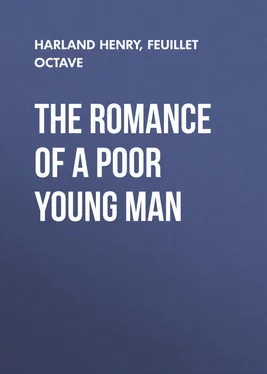Henry Harland - The Romance of a Poor Young Man
Здесь есть возможность читать онлайн «Henry Harland - The Romance of a Poor Young Man» — ознакомительный отрывок электронной книги совершенно бесплатно, а после прочтения отрывка купить полную версию. В некоторых случаях можно слушать аудио, скачать через торрент в формате fb2 и присутствует краткое содержание. Жанр: foreign_antique, foreign_prose, на английском языке. Описание произведения, (предисловие) а так же отзывы посетителей доступны на портале библиотеки ЛибКат.
- Название:The Romance of a Poor Young Man
- Автор:
- Жанр:
- Год:неизвестен
- ISBN:нет данных
- Рейтинг книги:5 / 5. Голосов: 1
-
Избранное:Добавить в избранное
- Отзывы:
-
Ваша оценка:
- 100
- 1
- 2
- 3
- 4
- 5
The Romance of a Poor Young Man: краткое содержание, описание и аннотация
Предлагаем к чтению аннотацию, описание, краткое содержание или предисловие (зависит от того, что написал сам автор книги «The Romance of a Poor Young Man»). Если вы не нашли необходимую информацию о книге — напишите в комментариях, мы постараемся отыскать её.
The Romance of a Poor Young Man — читать онлайн ознакомительный отрывок
Ниже представлен текст книги, разбитый по страницам. Система сохранения места последней прочитанной страницы, позволяет с удобством читать онлайн бесплатно книгу «The Romance of a Poor Young Man», без необходимости каждый раз заново искать на чём Вы остановились. Поставьте закладку, и сможете в любой момент перейти на страницу, на которой закончили чтение.
Интервал:
Закладка:
If, however, Feuillet's villains are failures, his adventuresses and bad women are grotesquer failures still. And no wonder. His reluctance to fashion an ugly thing out of material that would, in the natural course of his impressions, suggest to him none but ideas of beauty, is quite enough to account for it. Octave Feuillet is too much a gentleman, too much a preux chevalier , to be able to get any intellectual understanding of a bad woman; the actual operations of a bad woman's soul are things he can get no "realizing sense" of. So he dresses up a marionette, which shall do all the wicked feminine things his game necessitates, which shall plot and poison, wreck the innocent heroine's happiness, attitudinize as a fiend in woman's clothing, and even, at a pinch, die a violent death, but which shall never let us forget that it is stuffed with saw-dust and moved by strings. Madame de Campvallon, Sabine Tallevaut, Mademoiselle Hélouin, even Julia de Trécoeur – the more they change, the more they are the same: sister-puppets, dolls carved from a common parent-block, to be dragged through their appointed careers of improbable naughtiness. You can recognise them at once by their haunting likeness to the proud beauties of the hair-dresser's window. They are always statuesque, always cold, reserved, mysterious, serpentlike, goddesslike – everything, in fine, that bad women of flesh and blood are not. Octave Feuillet, the wit and the man of the world, knows this as well as we do; and knowing it, he tries, by verbal fire-works, to make us forget it. "She charms me – she reminds me of a sorceress," says some one of Sabine Tallevaut. "Do you notice, she walks without a sound? Her feet scarcely touch the earth – she walks like a somnambulist-like Lady Macbeth." It is the old trick, the traditional boniment of the showman; but not all the boniments in Feuillet's sack can make us believe in Sabine Tallevaut.
One can recognise Feuillet's bad women, too, by the uncanny influence they immediately cast upon his men. "More taciturn than ever, absent, strange, as if she were meditating some profound design, all at once she seemed to wake; she lifted her long lashes, let her blue eyes wander here and there, and suddenly looked straight at Camors, who was conscious of a thrill" – that is how Mme. de Campvallon does it, and the fact is conclusive, so far as her moral character is in question. None of Feuillet's good women would ever dream of making a man "thrill" at her first encounter with him. But Feuillet's bad women will stop at nothing. Julia de Trécoeur takes her own step-father, a middle-aged, plain, stout, prosaic country gentleman, and throws him into a paroxysm that has to be expressed in this wise: "It was a mad intoxication, which the savour of guilt only intensified. Duty, loyalty, honour, whatsoever presented itself as an obstacle to his passion, did but exasperate its fury. The pagan Venus had bitten him in the heart, and injected her poisons. A vision of Julia's fatal beauty was present without surcease, in his burning brain, before his troubled eyes. Avidly, in spite of himself, he drank in her languors, her perfumes, her breath."
Julia de Trécoeur has sometimes been called Feuillet's master-piece. One eminent critic remarks that in writing it Feuillet "dived into the vast ocean of human nature, and brought up a pearl." Well, there are pearls and pearls; there are real pearls and artificial pearls; there are white pearls and black pearls. It might seem to some of us that Julia de Trécoeur is an artificial black one. Frankly, as a piece of literature, the novel is just in three words a fairly good melodrama. Julia herself is the proper melodramatic heroine. Her beauty is "fatal," her passions are ungovernable, and she dearly loves a scene. Now she contemplates retirement into a convent, now matrimony, now a leap from the cliffs; and each change of mood is inevitably the occasion for much ranting and much attitudinizing. Her history is a fairly good melodrama. That it is not a tip-top melodrama is due to the circumstance that Feuillet was too intelligent a man to be able to make it so. He can't keep out his wit; and every now and again his melodrama forgets itself, and becomes sane comedy. He can't keep out his touches of things simple and human; the high-flown, unhuman remainder suffers from the contrast.
Why, one wonders, with his flair for the subtleties of the normal, with his genius for extracting their charm from trifles, why should Feuillet have turned his hand to melodrama at all? Is it partly because he lived in and wrote for a highly melodramatic period – "the dear, good days of the dear, bad Second Empire"? Partly, too, no doubt, because, as some one has said, the artist can never forgive, though he can easily forget, his limitations. Like the comic actor who will not be happy till he has appeared as Hamlet, the novelist, also, will cherish his unreasoning aspirations. And then, melodrama is achieved before you know it. Any incident that is not in itself essentially un dramatic will become melodramatic, when you try to treat it, it will become forced and stagey, if dramatic incidents are not the spontaneous issue of your talent. Dramatic incidents are far from being the spontaneous issue of Feuillet's talent; they are its changelings. His talent is all preoccupied in fathering children of a quite opposite complexion. Style, suavity, elegance, sentiment, colour, atmosphere – these are Feuillet's preoccupations. Action, incident, are, when necessary, necessary evils. So his action, when he is at his best, loiters, saunters, or even stops dead-still; until suddenly he remembers that, after all, his story must some time reach its period, and that something really must happen to advance it. Thereupon, hurriedly, perfunctorily, carelessly, he "knocks off" a few pages of incident – of incident fast and furious – which will, as likely as not, read like the prompt-book of a play at the Adelphi.
That absurd Sabine Tallevaut, whose feet scarcely touch the earth, with poison in her hand and adultery in her heart, is the one disfigurement upon what might otherwise have been Feuillet's most nearly perfect picture. In spite of her, La Morte remains a work of exquisite and tender beauty; and I'm not sure whether Aliette de Vaudricourt isn't the very queen of all his women. If Feuillet was too much a gentleman to be able to paint a bad woman, he was too much a man not to revel in painting a charming one. As we pass through his gallery of delightful heroines, from Aliette de Vaudricourt to Clothilde de Lucan, to Mme. de Técle, Marie FitzGerald, "Miss Mary" de Camors, Marguerite Laroque, even to Jeanne de Maurescamp, we can feel the man's admiration pulsing in every stroke of the artist's brush. He takes the woman's point of view, espouses her side of the quarrel, offers himself as her champion wherever he finds that a champion is needed. And he sticks to his allegiance even after, as in the case of Jeanne de Maurescamp, she might seem to have forfeited her claim to it. Of Jeanne he can still bring himself to say, at the end of L'Histoire d'une Parisienne : "Decidedly, this angel had become a monster; but the lesson of her too-true story is, that, in the moral order, no one is born a monster. God makes no monsters. It is man who makes them."
In this instance, however, Feuillet is, perhaps, rather the apologist than the champion. His contention is that Jeanne was by nature virtuous, and that her virtue has been destroyed by the stupidity and the brutality of her ill-chosen husband. But Feuillet has too fine and too judicious a wit to insist upon the note of strenuousness. Seeing the woman's point of view, he sees its humours as well as its pathos. Admitting that men for the most part are grossly unworthy of her, and that woman has infinitely the worst of it in the arrangements of society, admitting and deploring it, he doesn't profess to know how to set it right; he has no practical reform to preach. His business is to divert us, and, if he must be serious, to be serious gaily and charmingly. And perhaps he is most serious, not when composing an epitaph for Jeanne de Maurescamp, but when he is lightly saying (in the person of the Comtesse Jules): "Always remember, my poor dear, that women are born to suffer – and men to be suffered."
Читать дальшеИнтервал:
Закладка:
Похожие книги на «The Romance of a Poor Young Man»
Представляем Вашему вниманию похожие книги на «The Romance of a Poor Young Man» списком для выбора. Мы отобрали схожую по названию и смыслу литературу в надежде предоставить читателям больше вариантов отыскать новые, интересные, ещё непрочитанные произведения.
Обсуждение, отзывы о книге «The Romance of a Poor Young Man» и просто собственные мнения читателей. Оставьте ваши комментарии, напишите, что Вы думаете о произведении, его смысле или главных героях. Укажите что конкретно понравилось, а что нет, и почему Вы так считаете.












